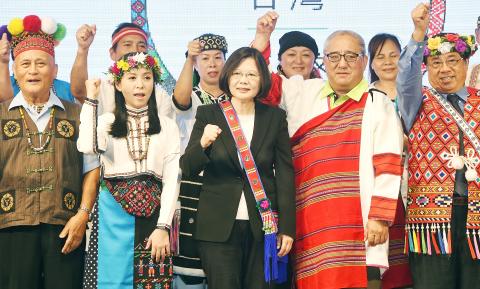Democratic Progressive Party (DPP) Chairperson Tsai Ing-wen (蔡英文) yesterday vowed to push for legal recognition of Pingpu Aborigines as well as Aboriginal autonomy once elected president.
Tsai made the vows during a news conference in Taipei to present her Aboriginal policy platform, marking her first policy presentation since she received the DPP’s official nomination as its presidential candidate.
“The DPP has not forgotten that Pingpu Aborigines are also members of Taiwan’s indigenous peoples, and they are entitled to the same degree of protection of their rights [as legally recognized Aboriginal people are] once their Aboriginal status is restored,” Tsai said, triggering a round of loud applause. “We will recognize the Pingpu Aborigines’ identity and right to make policy and laws, as well as actively preserve Pingpu languages and cultures, and, of course, as the population of [legally recognized] Aborigines increases, we will also increase relevant budgets.”

Photo: Liao Chen-huei, Taipei Times
Pingpu Aborigines are a number of Aboriginal communities that live mostly in the nation’s lowland regions whose cultures and languages are seriously threatened — some have already become extinct, while others are endangered.
Having been recognized as official indigenous peoples until the end of World War II, the Chinese Nationalist Party (KMT) regime ended official recognition of their ethnic status in the 1960s due to a series of administrative failures. In recent decades, Pingpu Aborigines have been campaigning for recognition of their Aboriginal status.
Tsai also said that, if elected, she would apologize to the nation’s Aborigines as president on behalf of the government.
“Why apologize? Well, looking back through history, Aborigines gradually lost their lands while under the rule of different governments and foreign powers,” Tsai said. “Even today, they continue to be at a disadvantage in areas including economy, education and health.”
The government must honestly face the exploitation and injustices suffered by Aborigines, the causes of the problems, Tsai said, so that reconciliation and transitional justice can be brought about.
Tsai also said that, if elected, she would push for Aboriginal autonomy, which would include clear definition of domains, land ownership and stable sources of income.
“The structure of the autonomous governments should be formed only after having fully negotiated with Aborigines on an equal basis,” Tsai said. “And Aboriginal communities must enjoy legal status as well.”

The manufacture of the remaining 28 M1A2T Abrams tanks Taiwan purchased from the US has recently been completed, and they are expected to be delivered within the next one to two months, a source said yesterday. The Ministry of National Defense is arranging cargo ships to transport the tanks to Taiwan as soon as possible, said the source, who is familiar with the matter. The estimated arrival time ranges from late this month to early next month, the source said. The 28 Abrams tanks make up the third and final batch of a total of 108 tanks, valued at about NT$40.5 billion

Two Taiwanese prosecutors were questioned by Chinese security personnel at their hotel during a trip to China’s Henan Province this month, the Mainland Affairs Council (MAC) said yesterday. The officers had personal information on the prosecutors, including “when they were assigned to their posts, their work locations and job titles,” MAC Deputy Minister and spokesman Liang Wen-chieh (梁文傑) said. On top of asking about their agencies and positions, the officers also questioned the prosecutors about the Cross-Strait Joint Crime-Fighting and Judicial Mutual Assistance Agreement, a pact that serves as the framework for Taiwan-China cooperation on combating crime and providing judicial assistance, Liang

A group from the Taiwanese Designers in Australia association yesterday represented Taiwan at the Midsumma Pride March in Melbourne. The march, held in the St. Kilda suburb, is the city’s largest LGBTQIA+ parade and the flagship event of the annual Midsumma Festival. It attracted more than 45,000 spectators who supported the 400 groups and 10,000 marchers that participated this year, the association said. Taiwanese Designers said they organized a team to march for Taiwan this year, joining politicians, government agencies, professionals and community organizations in showing support for LGBTQIA+ people and diverse communities. As the first country in Asia to legalize same-sex

MOTIVES QUESTIONED The PLA considers Xi’s policies toward Taiwan to be driven by personal considerations rather than military assessment, the Epoch Times reports Chinese President Xi Jinping’s (習近平) latest purge of the Chinese People’s Liberation Army (PLA) leadership might have been prompted by the military’s opposition to plans of invading Taiwan, the Epoch Times said. The Chinese military opposes waging war against Taiwan by a large consensus, putting it at odds with Xi’s vision, the Falun Gong-affiliated daily said in a report on Thursday, citing anonymous sources with insight into the PLA’s inner workings. The opposition is not the opinion of a few generals, but a widely shared view among the PLA cadre, the Epoch Times cited them as saying. “Chinese forces know full well that